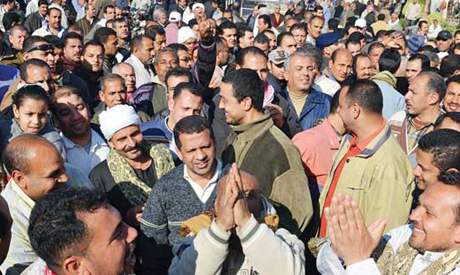
Mahalla workers chanting during their 9 day of the strike (Photo: Al-Ahram)
An attempt by Investment Minister Osama Saleh to end a strike by textile workers in Mahalla is unlikely to succeed, according to a labour activist.
Saleh said he expected strikers to return to work at the state-owned Mahalla Spinning and Weaving Company on Wednesday.
The strike entered its tenth day on Wednesday, with around 20,000 workers demanding a minimum wage, back pay of yearly bonuses, the removal of the company's head and the head of the firm's holding company.
Saleh has promised to appoint a new board that will include "experienced members," Al-Ahram Arabic news website reported.
But implementation of the LE1200 minimum wage would have to comply with regulations set by the National Wages Council, he added.
Accordingly, a committee will be formed to examine the current wage structure at all public textile companies.
Kamal El-Fayoumy, a striking worker and labour activist, told Ahram Online that workers had rejected the minister's proposals.
“We aren’t going to end our strike as predicted. The minister's statement is so vague and doesn't meet our demands explicitly, such as sacking the heads of the firm and its holding company,” El-Fayoumy said. “The minimum wage scheme remains in limbo as well.”
Sixteen out of 32 companies within the organisation have halted production as part of the strike.
Company boss Abdel-Fattah El-Zoghba stated on Sunday that the strike had taken its toll on the company’s revenues, with around LE20 million ($2.8 million) in estimated losses.
The company suffered a net loss of LE157 million ($22.5 million) in 2011, according to the official website of Egypt’s public sector.
Mahalla textile workers began a wave of labour action in 2006, and again in 2008, in one of the most significant challenges to the regime of former president Hosni Mubarak before the 2011 uprising that deposed him.
Short link: